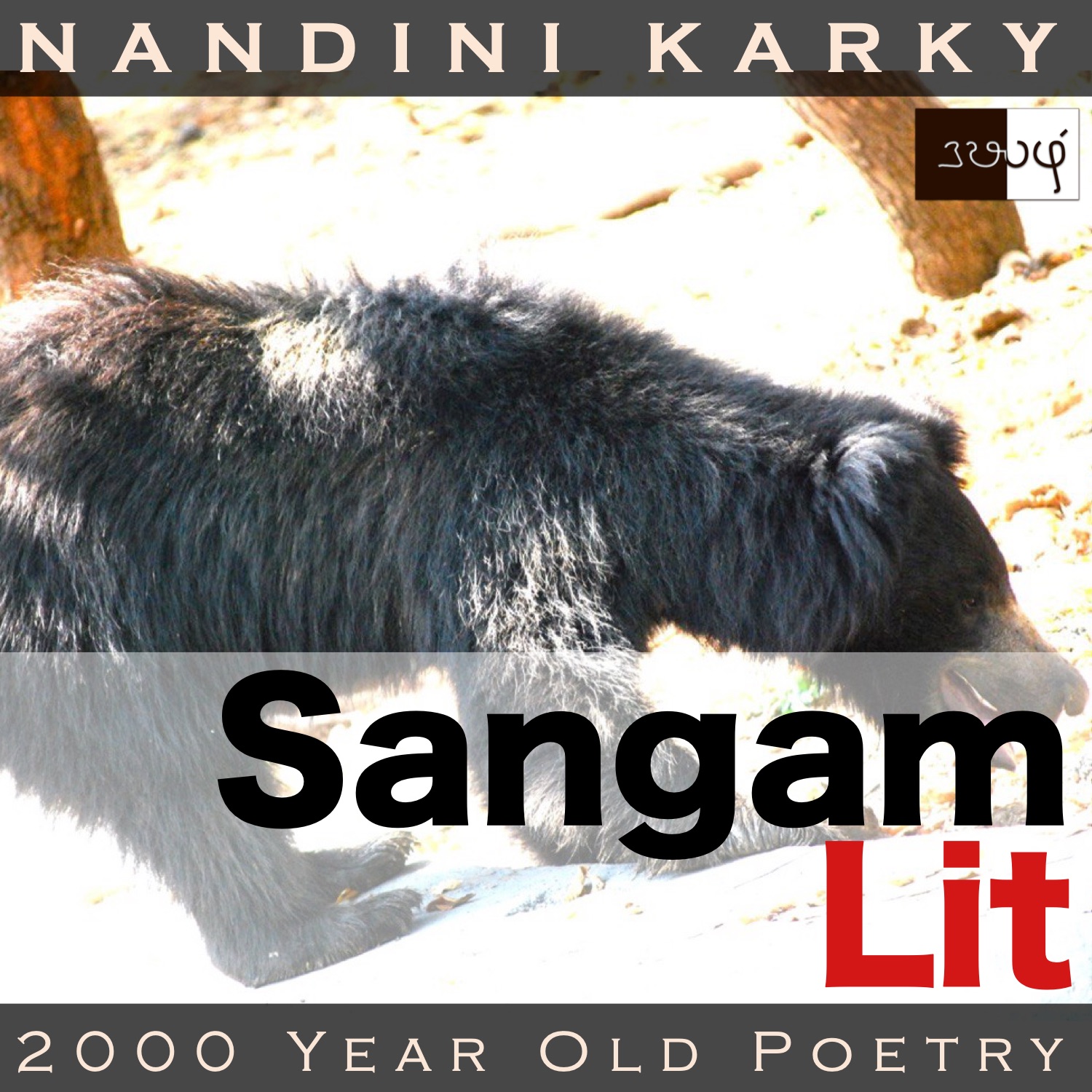Podcast: Play in new window | Download
Subscribe: Apple Podcasts | Spotify | Amazon Music | Android | iHeartRadio | TuneIn | RSS | More

In this episode, we appreciate the richness of metaphor and imagery in Sangam Literary work, Natrinai 125, penned by an anonymous poet. The poem is set in the ‘Kurinji’ landscape or mountain country and speaks in the voice of the confidante to the lady, consoling and advising her with regard to the man’s delay in seeking a formal union.
”இரை தேர் எண்கின் பகு வாய் ஏற்றை
கொடு வரிப் புற்றம் வாய்ப்ப வாங்கி,
நல் அரா நடுங்க உரறி, கொல்லன்
ஊது உலைக் குருகின் உள் உயிர்த்து, அகழும்
நடு நாள் வருதல் அஞ்சுதும் யாம்” என,
வரைந்து வரல் இரக்குவம் ஆயின், நம் மனை
நல் நாள் வதுவை கூடி, நீடு இன்று
நம்மொடு செல்வர்மன்-தோழி!-மெல்ல
வேங்கைக் கண்ணியர் எருது எறி களமர்
நிலம் கண்டன்ன அகன் கண் பாசறை,
மென் தினை நெடும் போர் புரிமார்
துஞ்சு களிறு எடுப்பும் தம் பெருங் கல் நாட்டே.
As the poem opens, we walk straight into ‘Jungle Book’ and see Baloo, the sloth bear, in action with the words ‘இரை தேர் எண்கு’ meaning ‘food foraging bear’. ‘ஏற்றை’ tells us it’s the ‘male’ of the species. Then, we hear a hiss in ‘நல் அரா’ or ‘cobra’. Shortly thereafter, we leave this animal world and meet with ‘வதுவை’ meaning ‘wedding’. ‘வேங்கைக் கண்ணியர்’ highlights the coinage of nouns from actions that we have frequently encountered in Sangam poems. Here, it means ‘those who wear garlands made of kino flowers’. Elements of a farmland are also sighted in ‘எருது’ meaning ‘bull’, ‘தினை’ meaning ‘millets’ and ‘போர்’, appearing in the meaning of a ‘haystack’ here. The final image is an intense and yet gentle scene of ‘துஞ்சு களிறு’ meaning ‘asleep elephant’. Let’s explore this mountain country to know more.
The man and woman have been in a love relationship for a while. The lady worries to see the man delaying their formal union, being only intent on his nightly trysts. Observing her friend in anxiety, the confidante tells the lady, “If you were to tell your man,‘Searching for food, the wide-mouthed male bear sees a termite mound with curved lines. It nears the mound, and roars aloud, making the cobra residing within to tremble in fear. Then, like a smith blowing through the nozzle of the bellows, it breathes into the mound and starts feeding on the termites. These events transpire in the middle of the night and that’s when you come, O lord. I fear for your safety’ and then, if you were to beseech him to seek your hand in marriage, he would come to our home on an auspicious day and wed you, without any delay. He would then take you to his land in the great mountains, where mountain folk wearing kino garlands would rouse sleeping elephants to thresh their slender millets and make great heaps of grain on a wide rocky surface, akin to a farmer’s field where oxen tread on, to thresh the crops.” With these words, the confidante enthuses the lady saying the man will surely wed her and relieve her angst, if she were to explain to him, her precarious situation.
Now, time to enjoy the nuances depicted in this verse. First, is the scene of the sloth bear. He roams the mountain forests and sights a termite mound. Reading on these architectural marvels of the natural world, I learnt that termites live much beneath these tall structures and they build these elaborate high-rises not to reside in them, but to ensure a moderate temperature and to keep off prey. The sloth bear seems to have googled about these termites too and is well-aware of this information, as well as the fact that snakes reside in these termite hills. Armed with this knowledge, the bear arrives at the scene and first roars loudly, which apparently makes the snakes tremble in fear and probably, makes them flee. Then, the bear blows inside the termite hills and the poem brings in a simile from the world of industry. The bear’s breath is likened to a smith’s breath through the nozzle of the bellows he uses in his hot furnace. This action would draw the termites out of the mound and then the bear would have his meal. This interesting scene is outlined to say that such dangerous events happen at midnight in those paths that the man walks to tryst with the lady. The confidante advises the lady to bring these terrifying images to the fore and tell the man that she fears for his safety.
The confidante is confident that the man will listen to the lady’s words and alleviate her fear by coming to their home on an auspicious day to marry her and that, he would take away the lady to his mountain country. The confidante paints a portrait of this mountain country as one where, mountain dwellers who wear kino garlands set out to wake the sleeping elephant in order to thresh their millet crops and heap a mound of grain. The reference to kino garlands is to say that the kino flowers have bloomed and that the harvest season was upon them. The ‘sleeping elephant’ is a subtle reference to the lord who seems to be unaware of the importance of acting without delay and the confidante urges the lady to rouse him with her words, so that she could reap the harvest of a happy married life.




Share your thoughts...